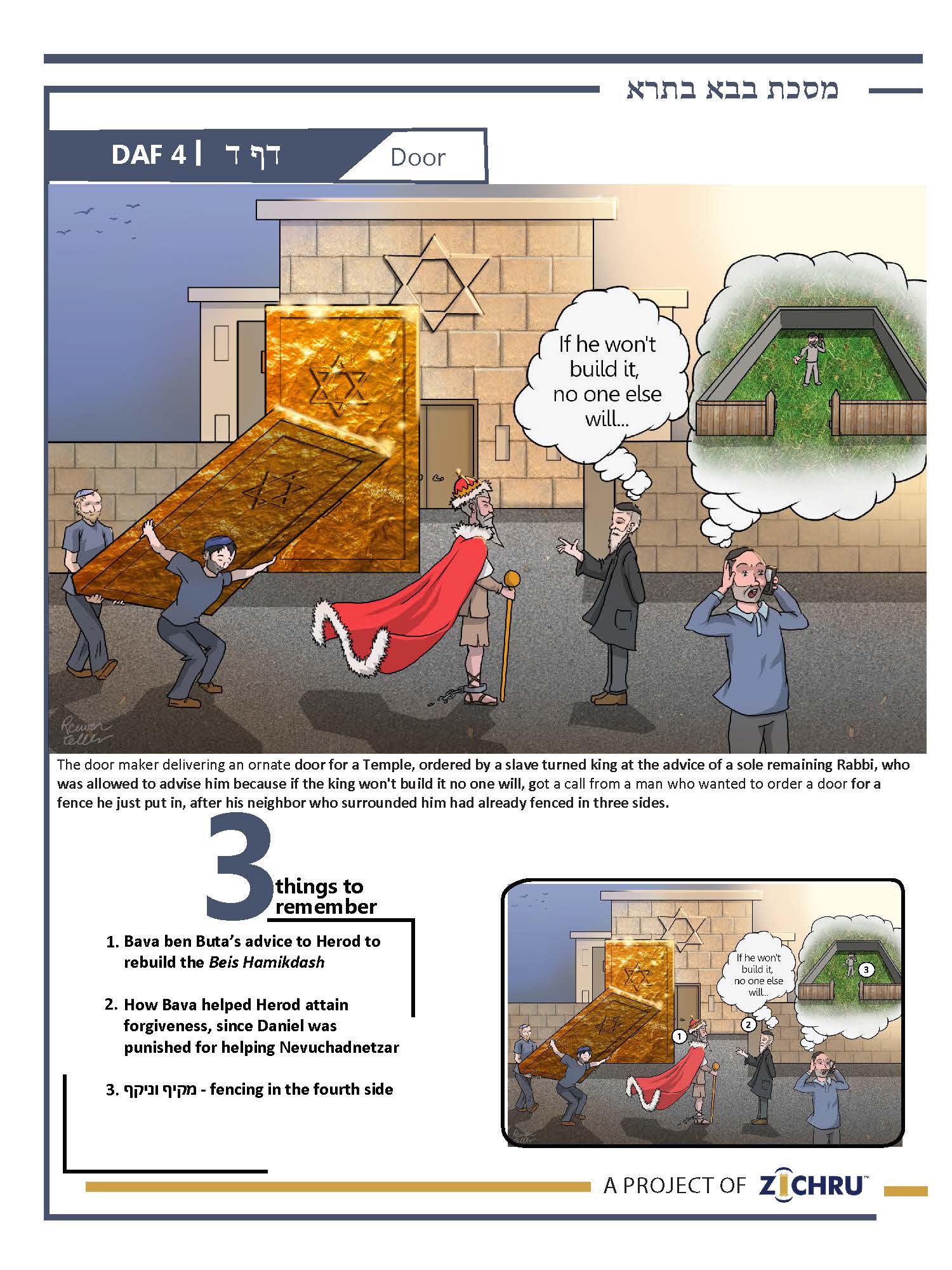Bava Basra - Daf 4
Audio Timestamps
0:00 - The 3 Sugyos
2:43 - Review of 3 Sugyos
5:12- Siman
8:03 - 4 Blatt Back Chazarah
15:06 - Pop Quiz (Last 7 blatt)
For access to all Zichru resources including PDFs, and illustrations CLICK HERE
- Bava ben Buta’s advice to Herod to rebuild the Beis Hamikdash
After Herod’s murderous rise to power from slavery, Herod killed all the Rabbis, because they disqualified a slave from being king. He spared Bava ben Buta to seek his advice but blinded him. After attempting to trick Bava into cursing him and finding that he would not, he regretted having killed the Rabbis, and asked Bava how he could achieve atonement. Bava told him: הוא כבה אורו של עולם – He extinguished the light of the world, by killing the Torah scholars, since Torah is compared to light, ילך ויעסוק באורו של עולם – he should go and occupy himself with restoring the light of the world by rebuilding the Beis Hamikdash, which is also compared to light. Herod expressed fear of the Roman government, and Bava told him to send an emissary to seek permission, and in the three years necessary to travel to Rome, remain there, and return, the rebuilding could be completed. Herod did so, and the Gemara records the Roman authorities’ rebuke. The Gemara says: מי שלא ראה בנין הורדוס לא ראה בנין נאה מימיו – Whoever did not see Herod’s building never saw a beautiful building in his life, and its multi-colored marble design is described.
- How Bava helped Herod attain forgiveness, since Daniel was punished for helping Nevuchadnetzar
The Gemara wonders how Bava ben Buta could provide advice to Herod to help him attain forgiveness, since Doniel was punished for helping Nevuchadnetzar!? Doniel advised Nevuchadnetzar to give charity to the poor, and Nevuchadnetzar thereby forestalled his punishment for twelve months. Two answers are given: (1) שאני עבדא דאיחייב במצות – a slave (like Herod) is different, since he is subject to some mitzvos, and so may be assisted in attaining forgiveness. (2) שאני בית המקדש – rebuilding the Beis Hamikdash is different, דאי לא מלכות לא מתבני – because without the king undertaking the project, it would not be built. In explaining where Doniel was punished, the Gemara first says that Hasach in Megillas Esther was actually Doniel. However, although this fits according to the opinion that he was called Hasach שחתכוהו מגדולתו – because they “cut him” (חתך) from his greatness, but according to the one who said the reason was שכל דברי מלכות נחתכין על פיו – that all government affairs were decided by him, this is not a punishment!? The Gemara answers that he was punished by being thrown into a lions’ den.
- מקיף וניקף
The next Mishnah states: המקיף את חבירו משלש רוחותיו – If one surrounds his friend’s field on three of its sides, and fenced those three sides, the inner neighbor is exempt from paying. Rebbe Yose says: אם עמד וגדר את הרביעית – if he (the inner neighbor) arose and fenced the fourth side, מגלגלין עליו את הכל – we place on him the obligation to contribute to all the fences. Shmuel rules like Rebbe Yose, regardless of who enclosed the fourth side. Rav Huna says he pays לפי מה שגדר – according to what [his neighbor] fenced with (i.e., half, regardless of materials used). Chiya bar Rav says he pays לפי דמי קנים בזול – according to the cost of cheaply bought reeds, since they would have sufficed to enclose his field. The Tanna Kamma implies that if the outside neighbor (מקיף) would later enclose the fourth side, the inner neighbor (ניקף) would have to contribute to the cost (since he now benefits from the enclosure). Five interpretations are given of the machlokes: (1) According to Rav Huna, they argue if he pays in full, or for cheap reeds. (2) They argue if he only pays אגר נטירא – a watchman’s hire, or for a reed enclosure. (3) They argue if he pays for the first three fences, which initially gave him no benefit. (4-5) They argue if he must pay even where the מקיף encloses the fourth side, or only if the ניקף does. Two opposite versions of this answer are given.
Siman – Door
The door maker delivering an ornate door for a Temple, ordered by a slave turned king at the advice of a sole remaining Rabbi, who was allowed to advise him because if the king won't build it no one will, got a call from a man who wanted to order a door for a fence he just put in, after his neighbor who surrounded him had already fenced in three sides.


